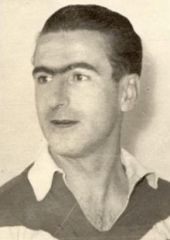Titus ozone
| Titus ozone | ||

|
||
| Personnel | ||
|---|---|---|
| birthday | May 13, 1927 | |
| place of birth | Bucharest , Romania | |
| date of death | November 24, 1996 | |
| size | 170 cm | |
| position | striker | |
| Juniors | ||
| Years | station | |
| Unirea Tricolor Bucharest | ||
| Men's | ||
| Years | station | Games (goals) 1 |
| 1944-1948 | Unirea Tricolor Bucharest | 33 (26) |
| 1948-1950 | Dinamo Bucharest | 38 (20) |
| 1951 | Dinamo Oraşul Stalin | 17 (8) |
| 1952-1954 | Dinamo Bucharest | 56 (35) |
| 1955-1958 | Progresul Bucharest | 66 (44) |
| 1958-1964 | Rapid Bucharest | 79 (33) |
| National team | ||
| Years | selection | Games (goals) |
| 1952-1962 | Romania | 22 (7) |
| Stations as a trainer | ||
| Years | station | |
| 1964-1968 | Progresul Bucharest | |
| 1968-1970 | Jiul Petroșani | |
| 1971 | Argeş Piteşti | |
| 1972-1974 | Libya | |
| 1974-1975 | Jiul Petroșani | |
| 1975-1976 | FC Brăila | |
| 1976-1977 | Pandurii Târgu Jiu | |
| 1977-1988 | Azotul Slobozia | |
| 1978-1979 | Șoimii Sibiu | |
| 1 Only league games are given. | ||
Titus Ozon (born May 13, 1927 in Bucharest , † November 24, 1996 ) was a Romanian football player and coach . He played 270 games in the highest Romanian football league, Divizia A , and was two Romanian top scorer. He also took part in the 1952 Olympic Games .
Career as a player
Titus Ozon started his career in his hometown Bucharest at Unirea Tricolor . There he moved up to the first team in 1944, but did not play for the first time in the top division, Divizia A, until October 26, 1947 due to the war-related interruption of the game . When Unirea Tricolor merged with local rivals Ciocanul Bucharest to Dinamo Bucharest in May 1948 , he came into the squad of Dinamo's first team.
At Dinamo ozone was a regular player, but moved at the beginning of the 1951 season to league rivals Dinamo Oraşul Stalin , who had emerged from the second team of Dinamo. After only one year he returned to Dinamo and experienced the most successful seasons of his career in 1952 and 1953 , when he became the most successful scorer in Divizia A in addition to the runner-up.
In 1954 Ozon wanted to leave Dinamo because he did not agree with the machinations of the club. He was then kidnapped by the Securitate secret police in the Danube Delta and held captive. One night he escaped and returned to Bucharest. Once in the capital, he joined local rivals Progresul , who had just been promoted to the House of Lords.
At Progresul he was also able to prove his goal-scoring ability, but was no longer used regularly from 1957. Events of 1954 caught up with him during a tournament in Greece. Ozon was suspended and only pardoned again when he promised to play for Rapid Bucharest , the club of Romanian President Gheorghe Gheorghiu-Dej , in the future . After six changeable years, he ended his career there in 1964. In 1961 and 1962 he was able to move into the cup final with Rapid.
National team
Between 1952 and 1962, Ozon made 22 appearances for the Romanian national football team , scoring seven goals. He had his first use on May 11, 1952 against Czechoslovakia , when he came on towards the end of the encounter and scored the 3-1 final score. In the same year ozone was part of the squad for the football tournament of the Olympic Games in Helsinki , where he was used in the game against the eventual Olympic champion Hungary .
In the fall of 1962, after a five-year absence, Ozon returned to the national team for three games and was their captain .
Career as a coach
After the end of his active career, Ozon worked as a trainer . From 1964 to 1968 he was in charge of his former club Progresul Bucharest , with which he managed to rise again immediately after relegation in 1965 . He then took over the league competitor Jiul Petroşani , with whom he narrowly missed qualifying for the European Cup twice.
After a brief engagement with Argeş Piteşti in 1971, Ozon took over the Libyan national team in 1972 . Two years later they parted ways and he returned to Romania, where he again looked after Jiul Petroșani. After further positions at FC Brăila ( Divizia B , promotion narrowly missed), Pandurii Târgu Jiu ( Divizia C , promotion), Azotul Slobozia (Divizia C) and Șoimii Sibiu (Divizia B), he ended his coaching career in 1979.
successes
As a player
- Olympic Games participants: 1952
- Romanian runner-up: 1952 , 1953
- Romanian Cup finalists: 1954 , 1958 , 1961 , 1962
- Romanian top scorer: 1952 , 1953
As a trainer
- Promotion to Divizia A: 1966
- Promotion to Divizia B: 1977
Others
After Titus retired from the soccer business in 1980, he went to work in industry.
Individual evidence
- ↑ a b hotnews.ro from July 15, 2008 (Romanian)
Web links
- Titus Ozon on romaniansoccer.ro (English)
- Titus Ozon on sportpedia.mysport.ro (Romanian)
| personal data | |
|---|---|
| SURNAME | Ozone, Titus |
| BRIEF DESCRIPTION | Romanian soccer player and coach |
| DATE OF BIRTH | May 13, 1927 |
| PLACE OF BIRTH | Bucharest |
| DATE OF DEATH | November 24, 1996 |